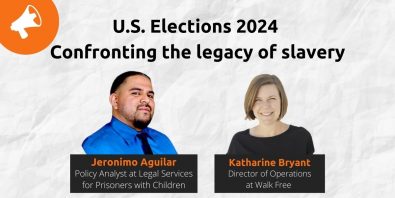Nicholas’s life in the California prison system was dictated by forced labor. Sick or not, he was required to report to his 4:30 a.m. kitchen shift daily, facing punishment or the risk of losing privileges if he missed work. He writes for Teen Vogue,
“Where else in America is slavery still legal? Where else can someone whose freedom has already been taken away face further restrictions for refusing to work? Only in prison and jail.”
Across California, similar stories reveal an exploitative system deeply rooted in the state’s history. As California voters prepare to vote on Proposition 6, which would amend the state constitution to ban involuntary servitude in prisons and jails, voices like his amplify the importance of this historic vote.
A legacy of forced labor
The “exception clause” in both the state and U.S. constitutions has permitted forced prison labor since the state’s inception, echoing centuries-old practices used to exploit Indigenous populations and, later, African Americans and other marginalized groups.
In light of these pressing issues, Freedom United hosted a panel discussion to raise awareness about the implications of Proposition 6 and the broader fight against forced labor in the prison system. The panel featured Katharine Bryant from Walk Free and Jeronimo Aguilar from Legal Services for Prisoners With Children. They underscored the urgency of the situation.
Bryant made one issue very clear: rehabilitation requires choice and access to fair labor conditions, which are notably absent in current prison work structures. She explained,
“People want to work in prison, but the key part is it not being mandatory and having access to decent labor rights.”
Aguilar pointed out,
“When you get incarcerated, the punishment IS the incarceration, you shouldn’t lose your human rights. It shouldn’t mean your body can be used as an economic tool for exploitation.”
Bryant followed up with on the massive profits being made off of prison forced labor:
“The average payment for work done in prison is $1, but it is an $11 billion industry, and many industries are benefiting economically from people being forced to work in prisons.”
A call to action
As California voters approach the polls this November, the importance of voting yes on Proposition 6 cannot be overstated.
“Voting yes to Proposition 6 this November is a powerful way to take action against, in effect, modern-day slavery and help change oppressive systems.”
We completely agree. Forced labor has no place in California prisons – or anywhere else in the U.S. Join us in calling for the complete abolition of forced labor in the U.S. prison system. Sign our petition to demand that lawmakers address the exception in the Thirteenth Amendment once and for all.





Freedom United is interested in hearing from our community and welcomes relevant, informed comments, advice, and insights that advance the conversation around our campaigns and advocacy. We value inclusivity and respect within our community. To be approved, your comments should be civil.